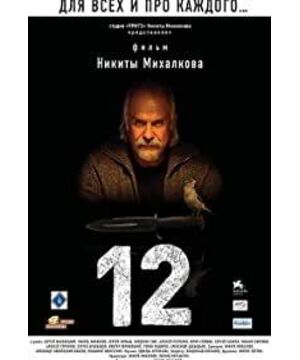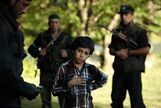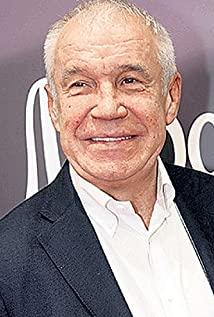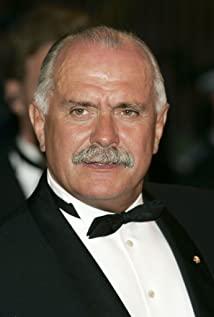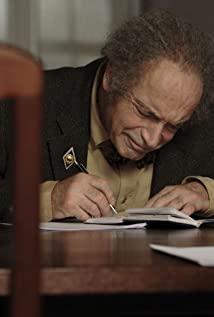Twelve men, strangers to each other, gather on the court's makeshift basketball court - a place that is not serious, to decide the life and death of a Chechen boy.
Every "Twelve Angry Men" is about some kind of social contradiction in the country, people's inner discrimination and stereotyped prejudice. The Russians are discussing the case of a Chechen boy accused of murdering his Russian adoptive father.
The film was released in 2007. Before that, the Russian Federation experienced a series of terrorist attacks, apartment bombings, Moscow theater hostage incidents, Beslan hostage incidents, each more tragic, all of them suffered heavy casualties, that is to say, at that point in time , just after the two Chechen wars, when terrorism committed suicide and the price was directly on ordinary people.
Chechnya is a scar on the bears, and they themselves are also scarred. Grozny was almost reduced to ashes at one point, and the Russian army also suffered heavy casualties. In the film, not only is the taxi driver a Chechen brat, he is a savage, uncivilized, able to sing and dance, and the leader of the Chechen rebels with some majesty-it is somewhat inaccurate to directly define him as a terrorist here, because the film There is no indication that he committed terrorist acts.
It can be seen that at that time, the Russians and the Chechens had already experienced a national emotional rupture.
In Chechnya, there are ethnic issues as well as historical issues, which cannot be simply categorized. If other people's stories can become a mirror for us, we can even see very similar shadows from other people's countries, which is worthy of our own vigilance and reflection.
No matter how far away, Stalin adopted a policy of coercive ethnic integration during the former Soviet Union, forcing the Chechens to leave their country and exiled to various parts of the Soviet Union to complete assimilation with this kind of ethnic migration; later, in order to appease The ethnic minorities who have gradually returned to their homeland have given preferential treatment and subsidies in economic construction, at the expense of the interests of the main ethnic Russian ethnic group, emphasizing their ethnic characteristics, such as customs and so on, which not only buried hidden hidden dangers of nationalism, It also artificially cut off the natural fusion of national cultures; from the late Soviet era to the early disintegration period, the central power was gradually dispersed, and even weaker than the local power. When the repressive policy disappeared, the suppressed nationalism would definitely break out.
If we say that this is a human experiment, then the attempts on the Chechens in the former Soviet Union failed one by one, causing great harm to both Russian society and the Chechens themselves.
Is it similar?
In war, in fact, only children are completely innocent.
Chechen orphans have lost their parents, even their beloved puppy in the end. He used to take refuge in the hail of bullets and stayed with the corpses of Chechen rebels. He recognized the Chechen rebel. In his eyes, he was not a bad person. That person once looked at him dotingly, handed him the knife to play with, and danced with him. How can a child know that there are different political opinions, how can he know that there are terrible killings behind the realization of political goals, he has not even seen them who can sing and dance well one second, and the next second they have completely different cruel expressions on their faces .
He took away the man's knife. This was not for revenge. The worship of the knife was a national character flowing in his blood. In a sense, it was his root.
The Chechen orphan was taken away by Russian officers. His family once showed kindness to the Russian soldiers who came to Chechnya. Maybe that's why his parents were killed. So, what exactly is revenge for a child who has nothing?
However, social groups often identify individuals based on simple identity labels, and no one knows the sorrow and contradictions behind this. The facts seem to be clear, at a glance, and maybe that's what the 12 thought when they arrived at the less serious stadium, as if the court staff told them: the evidence is solid, this is a very simple case, and it's useless How long will it take to have results.
Someone was eating free food, someone was playing the piano in high spirits, and inadvertently displayed small details that distanced people from each other: expensive watches, shiny rings, elegant clothes. Everyone has their own life experience behind them, but there is no absolute, no absolute good person, and no absolute bad person.
A physicist who has been hit by reality once gave up his life due to alcoholism; a well-informed taxi driver who identifies a person with labels; a retired military officer who has not spoken much, seems to have found the orphan to be guilty, but in his heart It's another idea - he thinks the orphan is innocent, but he hopes it will give him the best possible ending.
On such occasions, civic duty also cannot prevent people from hurrying, as if intending to follow the crowd at any time, similar to what the Chinese call the spirit of muddy mud. There are also people who plan to make a big fight, but they are destined to be anxious and impatient because of the lack of seriousness of others.
The first person who dares to be the only one who is different, this person may not necessarily find the orphan innocent from the bottom of his heart, but is this one-sided and uncontested view reliable? He was suspicious. Maybe we should give the juvenile one more chance to be confirmed, and give the law and the truth another chance.
Above all, the only opponent, the pressure to face, is the collective prejudice of this society, which he must challenge: the Chechen orphan who killed his Russian military adoptive father in revenge. In terms of identity, people's identification is like this. Such an identity background seems to be associated with such a story, and such a story is bound to happen.
Even, it is believed that the lawyer who did not try his best to defend the orphan represented "some kind of justice" rather than the lawyer's dereliction of duty. Suddenly I thought of China's "Twelve Citizens", the identity of the rich second generation and the poor biological father, who are the vulnerable groups at a glance, but caused such a phenomenon, no matter what the truth is, the rich second generation suddenly became because of such a label. de facto vulnerable groups. At that time, the most arguing was the Li Moumou incident. Because of the decision to take the innocence defense, it seemed that the lawyers had become the target of public criticism and were accused of making money regardless of right or wrong. In fact, the defense of innocence is only a defense method of the law, and it only means that the current evidence may not be able to convict the suspect.
As the lowest moral bottom line of human beings, the law was formulated from the concept of the person bound by it. This is so that in many Asian countries, the crime of raping a young girl will even receive a lighter punishment. This is the concept of people in the past. , and practical difficulties.
The rationale became clearer and clearer, and at first it was just a legal spirit—questioning, seeking evidence, and advancing the truth bit by bit. People who had nothing to do with themselves at first began to sway their opinions, began to seek evidence spontaneously, and gradually strengthened their thoughts. When a person's views become more firm and clear, he will start to be more sincere, just like political views and religious beliefs, everyone will defend their views that they think are correct, so the truth finally emerges.
However, the Russian version of "Twelve Angry Men" put forward the point that the law is supreme, and it can be used correctly by people. However, the Russian society at that time may need kindness above the law more - to mend the broken national sentiment, which the law may not be able to do, only kindness can.
It seems that this is a completely different view from the Japanese version of "Twelve Angry Men" - the Japanese version proposes that everyone is equal before the law, and the legal principle is greater than the rational. However, two completely different starting points, the result is the same.
I would also like to add that, as a minority group, they have been unable to integrate into mainstream society for a long time, and when legal and violent institutions are also inclined to the mainstream, they can only protect their own interests through an extra-legal and extremist organization, such as Russian gangsters and gangsters. Central Asian groups. This method is wrong, no doubt, no matter how deep the reason is, it is not forgivable "excusable". This is the reason why I sometimes bother reporters to write some in-depth analysis of excessive sadness and misleading public opinion.
However, it is the whole society that is sick.
View more about 12 reviews


